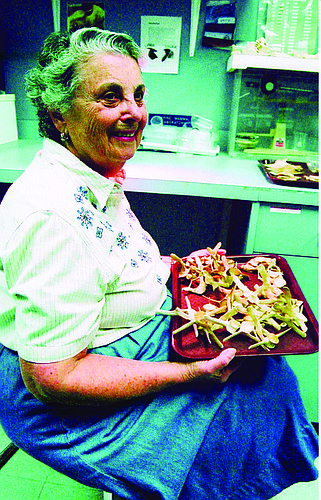- April 15, 2024
-
-
Loading

Loading

Mote Marine Laboratory volunteer and adjunct scientist Ruth DeLynn, who was known as “The Bone Lady,” died July 8. She was 87.
DeLynn, a Longboat Key resident, created and curated the laboratory’s collection of dolphin and whale skeletons so they could be used in further studies. In 2007, the collection was officially named the Ruth DeLynn Cetacean Osteological Collection in her honor.
Born Oct. 16, 1926, in New York, she raised her family in Westchester and worked as a vertebrate biologist for the American Museum of Natural History. She retired to Longboat Key approximately 30 years ago and began volunteering at Mote, just as its Marine Mammal Department was getting started.
When she began her work at Mote, the laboratory’s policy was to throw away animal remains, a policy DeLynn quickly changed.
“I thought it was ridiculous that all of these animals were being discarded,” DeLynn told the Longboat Observer in 2007.
“Her passion really impressed me the most,” said Dr. Kumar Mahadevan, Mote’s president emeritus in a July 10 story on Mote’s website, mote.org. “She really helped us understand how important it was to develop this collection and all of the information we could gain by developing it. Then she set off to make it happen. Her husband, Hubert, was her best friend and a real cheerleader for her creation of the collection and, through it, she really made a difference.”
The collection DeLynn developed is known for the detailed documentation that accompanies each specimen. The collection allows scientists to determine subtle differences between populations and abnormalities and pathologies among individuals. One key aspect of DeLynn’s collection is that it contains whole skeletons — not just the skulls, as is the case with many animal bone collections.
Today, Mote’s Stranding Investigations Program recovers stranded cetaceans and performs detailed necropsies to determine the cause of death. After the necropsy, bones are prepared for the DeLynn Collection, through which scientists can later use them to further knowledge of dolphins and whales.
DeLynn was preceded in death by her husband, Hubert. She is survived by her daughter, Nina Berk, of Newton Mass.; son, William DeLynn, of Rye Brook, N.Y; and four granddaughters.
A celebration of life will take place at a later date. Memorial donations can be made in DeLynn’s name to Mote’s Stranding Investigation Program or the Ruth DeLynn Cetacean Osteological Collection, 1600 Ken Thompson Parkway, Sarasota, FL 34246 or mote.org.